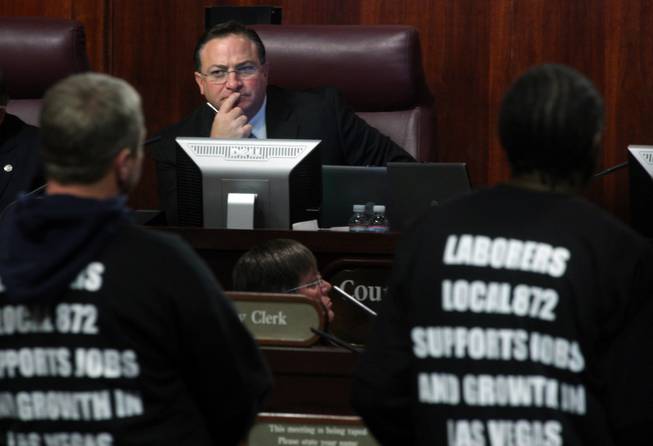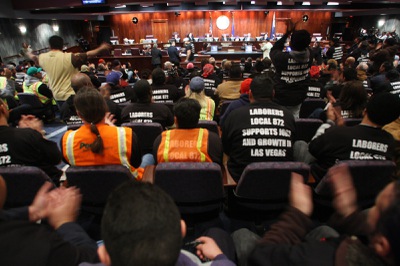
Las Vegas City Councilman Steve Ross, who’s also the leader of Southern Nevada Building and Construction Trades Council, listens to a speaker at last week’s meeting.
Sunday, Feb. 22, 2009 | 2 a.m.

Members of Laborers Union Local 872 cheer a move last week by the Las Vegas City Council. The union members had packed the council chambers in support of Mayor Oscar Goodman's plan to build a multimillion-dollar city hall. If eventually approved, the construction project would likely employ many in the audience.
For a minute, it was Steve Ross’ show.
The Las Vegas city councilman and leader of the Southern Nevada Building and Construction Trades Council grinned, taking it all in Wednesday.
More than 300 unemployed laborers — members of the building trades’ largest affiliate — packed the city council chambers to support construction of a city hall, a $150-million-to-$267-million project that would put them all back to work. And Ross, as a city councilman, was in a position to make that happen.
But he knew that voting on the project would be flirting with a conflict of interest. So, for the record, he disclosed to everyone in attendance what they already knew: his union leadership job. He noted that he had sought the advice of the city attorney, who, in turn, quickly cleared him to vote. The union crowd erupted with applause. The cheers were nearly as loud as the ones that followed the council’s unanimous vote that moved the city hall project along.
This was the scenario the Nevada Ethics Commission had envisioned two years ago when it warned Ross against taking the building trades post. Officials worried that the city councilman would have to abstain so often that his constituents would be deprived of their voices. Instead, Ross has rarely disclosed his union job and abstained.
That’s significant, given that during the time he’s held both posts — on the City Council and heading the construction trades council — he has voted to approve at least $80 million in union contracts benefiting his members.
Add to that voting record this stroke of chutzpah: According to labor and political insiders, the Nevada AFL-CIO, on behalf of Ross’ trades council, engineered the filing of an ethics complaint last year against Warren Hardy, a Republican state senator who’s also president of the nonunion contractors trade group.
The core charge: Hardy is too conflicted to be an effective lawmaker, failing to disclose and abstain on legislation affecting contractors.
In Carson City, lobbyists say the state labor federation’s role in the complaint is an open secret. During last year’s special legislative session, Danny Thompson, executive secretary-treasurer of the Nevada AFL-CIO, boasted about the federation’s involvement in the Hardy complaint, lobbyists familiar with the situation told the Sun.
From the outset, Hardy dismissed the complaint as political retaliation by labor for his opposition to a bill in the 2007 Legislature that would have extended the state’s “prevailing wage” law on public works to private construction.
The legislation died in committee because of Republican opposition to a labor-backed amendment — proposed by Thompson and moved for adoption by Assemblywoman Peggy Pierce, resource coordinator of the United Labor Agency of Nevada, the community services arm of the state AFL-CIO.
The trades council and Hardy are long-running enemies.
The back story to the ethics complaint is curious. It was filed by Richard Miller, a retired New York City schoolteacher living in Hardy’s Henderson district.
Miller said he acted on his own, after his Sun City Anthem home was damaged by faulty plumbing. He argued that Hardy supported a 2003 bill that gave contractors the “right to repair” instead of being targeted in a lawsuit for construction defects. According to the complaint, it was one in a series of contractor-related bills over three sessions on which Hardy failed to adequately disclose or abstain.
To draft the 32-page complaint, Miller retained the services of attorneys Richard McCracken and Paul More, of Davis, Cowell & Bowe LLP, a well-known union law firm with blue-chip labor clients. McCracken, for instance, is international counsel to Unite Here, the 400,000-strong parent union of the Culinary Union. He’s also counsel to the Nevada AFL-CIO.
Miller said he got the name of the firm from friends at the Nevada Alliance of Retired Americans, an organization of retired union members, and paid for the legal work himself. Miller and Thompson are vice presidents on the group’s board of directors.
Asked whether the state labor federation was involved in the Hardy complaint, Thompson demurred. “The AFL-CIO put up no money,” Thompson said. “Clearly, we lobbied on those (construction) bills, and there were promises made that weren’t kept. Beyond that, I don’t know.”
The complaint lead to an unexpected result. The ethics commission dismissed all but two of Miller’s charges — and, upon review, the judicial district court in Carson City ordered the ethics commission to take no further action, arguing that it had violated the separation of powers. A judge said disciplining state lawmakers is the province of the Legislature alone, not the executive branch.
It’s all the more surprising that labor chose to attack Hardy given Ross’ own record of voting on issues that directly benefit members of his trades council. The problem was apparent from the outset as Ross, a city councilman, sought an opinion on whether he should run for union office. In a 4-1 decision, the ethics commission gave him a pass, but cautioned that conflicts could arise, especially on competitive bidding projects. The commission’s then-chairman, Jim Kosinski, said Ross would be “walking a field of land mines,” and that if he were to find himself before the body again, the ethics commission would not look kindly on him.
The conflict issue was even raised by building trades leaders. But Ross assured them he could wear both hats, and he was elected secretary-treasurer of the 20,000-member Southern Nevada Building and Construction Trades Council in 2007.
Ross did not return phone calls seeking comment for this article. A call to his personal cell phone was returned by a Las Vegas city spokesman, who said he would relay to Ross the topic of the article and the Sun’s request for an interview.
In the past, Ross has said he has been careful to separate his two roles.
“I keep my city council office and this building trades office extremely far apart, and I do it on purpose,” he told the Sun last year. “I don’t want any thought of me mingling the two. I don’t want that to be clouded. I don’t want that to be gray. It’s very black and white.”
But those remarks don’t square with his votes on the new city hall. Nevada law says simply, “A public officer or employee must commit himself to avoid conflicts between his private interests and those of the general public whom he serves.” The ethics statute also says elected officials should abstain on an issue if the benefit to them, either as an individual or representative, is “greater than that accruing to any other member of the general business, profession, occupation or group.”
On Wednesday, Las Vegas City Attorney Brad Jerbic told Ross he could vote because the project had not “gone to contract” or received final approval from the City Council. The laborers in the audience, Jerbic said, have “just as much opportunity as any other worker in Southern Nevada to apply for those jobs.”
The laborers spent the better part of two hours pleading for the jobs, and Las Vegas Mayor Oscar Goodman all but promised to put them to work.
Hardy is one of Ross’ biggest defenders: “As long as he’s following the rules, I’ll defend to the death his right to be part of the process.”
CORRECTION: This story has been changed to reflect that Assemblywoman Peggy Pierce, originally identified as executive director of the United Labor Agency of Nevada, is resource coordinator. The article also incorrectly said Nevada AFL-CIO leader Danny Thompson proposed a labor-backed amendment to a Senate bill. The amendment was proposed by Richard Daly, business manager of Laborers Local 169, an affiliate of the Nevada AFL-CIO.

Join the Discussion:
Check this out for a full explanation of our conversion to the LiveFyre commenting system and instructions on how to sign up for an account.
Full comments policy